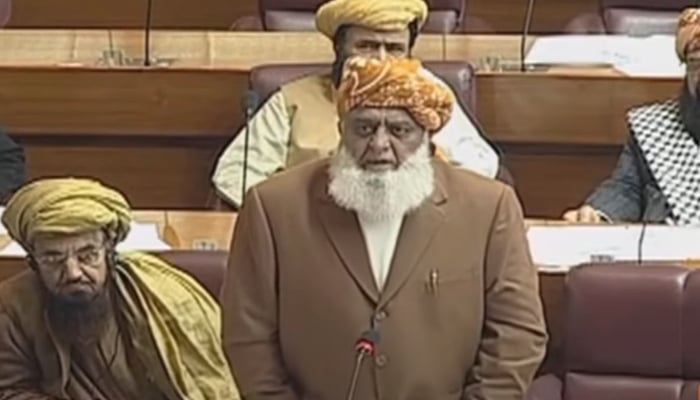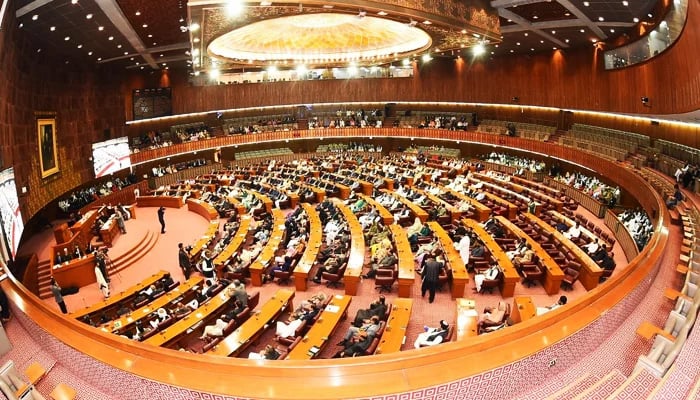Madrassa bill: Decision to be made on streets if demands not met, Fazl warns govt
JUI-F chief slams bureaucracy and establishment for not accepting curriculum of religious seminaries

ISLAMABAD: Jamiat Ulema-e-Islam-Fazl (JUI-F) chief Maulana Fazlur Rehman on Tuesday threatened to launch a protest drive if the government further delayed the matter and refused to notify Societies Registration (Amendment) Act 2024 passed by both houses of parliament.
Addressing the National Assembly session, Fazl said legislation on the bill regarding madaris was made after the government expressed satisfaction on it. Whereas, the matter of registration of madaris in the Ministry of Education was part of an agreement, not an act, he added.
“As per the agreement, the government would cooperate in the registration of new madaris. There was an agreement that registration of those madaris that have been registered will be maintained.
“The agreement mentioned bank accounts of madaris will be opened and 3-year visas will be issued for foreign students of madaris,” however, he said, neither bank accounts were opened nor visas were issued for students. Hence, he said, that agreement was broken by the government.
Then they talked about the education ministry and President Asif Ali Zardari raised an objection in the bill on October 28, which was corrected by the NA speaker terming it a human error, before sending it back to the President House.
“Which meant the bill was received by the President’s House on October 28,” he added.
Maulana Fazl emphasised the president had the right to raise objection once but not the second time. If the president did not sign the bill, then it became an act after 10 days, he maintained.
He also apprised the legislators that there was no mention of registration with the education ministry in the bill that was passed in the 26th Constitutional Amendment.
The JUI-F chief said madaris were earlier registered under the Societies Act of 1860.
He reiterated that the President House’s raising objection for a second time was unwarranted.
The speaker in an interview said, the JUI-F supremo apprised the House, the bill had become a law as per the books. The speaker cited an example from former president Arif Alvi’s tenure when a bill became law despite the then president’s not signing it, he noted.
In his remarks on the bill’s making an act will allegedly draw the anger of foreign powers, he said not a single parliamentarian was kept unaware regarding progress on the bill.
“Now they say that this will infuriate the FATF and others. If we are not free [nation] then let us know,” he said, adding that the cat was out of the bag that our legislations were made on “their” instructions.
“Are our legislations being made on other countries’ whims and desires? We are trying not to move towards bitterness. The religious seminaries have established in the last 24 years that they are with the law and constitution as well as the government,” he said.
Fazl said he was not against the modern education, noting the madaris students even achieved first, second and third positions in conventional educational institutes.
The politico said the Ittehad Tanzimat Madaris Deenia (ITMD) had given its stance that the bill had become an act. However, he said, the question was that why a gazette notification was not issued for it.
He also expressed anger over creating division among the religious scholars, saying the attempt would fail and they would not fight among themselves.
Reacting to Fazl’s remarks, Law Minister Azam Nazeer Tarar said the bill was definitely passed by both houses with the 26th Constitutional Amendment.
Nevertheless, as per the Constitution’s Article 50, he said, the president was a part of the parliament and no legislation could be completed without his signature.
“As per Article 75, the president either approves the bill within 10 days or returns it to the parliament. When the president returns the bill, then it is presented before a joint parliamentary session, as per the Constitution. Then, the bill is passed in the joint session, with or without amendments,” he said.
Fazl replied that the president did not raise any objection when the speaker said there was no need to convene a joint session of the parliament. “When he [the president] did not object to it then the discussion ended.”
“The speaker said the mistake had been corrected. You should let this become a law, after that we will discuss other things. Consider things separately and do not mix them,” he said.
The JUI-F chief also said not accepting the curriculum of religious schools was the mentality of bureaucracy and establishment. The real religious seminaries should not be destroyed for the khalai ones, he added.







